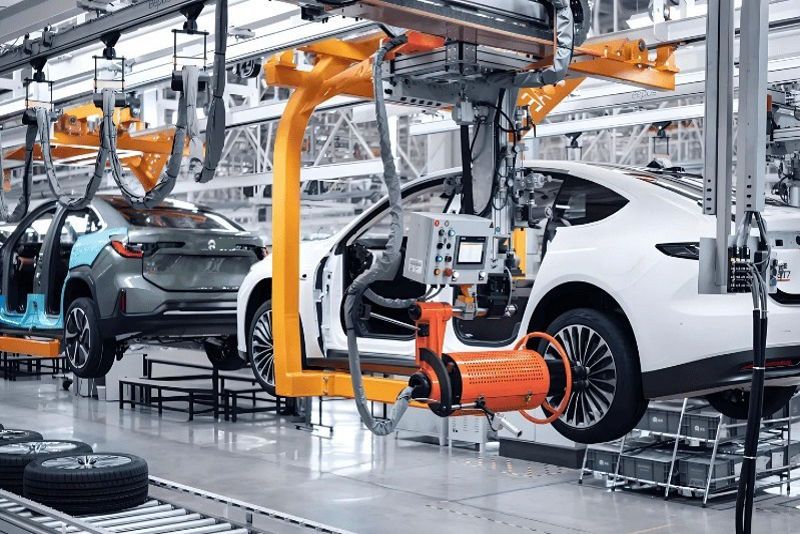In the automotive industry, steel made from special alloys plays a vital role in ensuring safety, performance, and durability. Whether it’s the strength of high-carbon steel, the flexibility of advanced high-strength steel (AHSS), or the corrosion resistance of stainless and galvanized steel, each alloy contributes to building safer and more efficient vehicles.
From the engine to the chassis and body panels, about 80% of a car’s weight comes from these engineered steels - making them the foundation of modern automotive manufacturing.
In this article, we will explore why automakers prefer these specialized steels, their compositions, benefits, and how you can buy automotive-grade steel online at JSW One MSME.
1. Stainless Steel - Durable and Corrosion Resistant
Stainless steel is essential for components that face high temperatures and exposure to moisture - such as exhaust systems, catalytic converters, and manifolds.
Composition:
Stainless steel is made primarily from iron and at least 10.5% chromium, which creates a protective oxide layer that prevents corrosion. It also includes:
• Nickel - Adds flexibility and toughness
• Molybdenum - Enhances resistance to chloride corrosion
• Titanium - Improves weldability and high-temperature performance
Benefits for Automakers:
• Exceptional corrosion resistance and heat tolerance (up to 1500°C)
• Low thermal conductivity for better engine efficiency
• Ideal for exhaust systems and high-heat environments
Explore premium stainless steel options for your automotive projects on JSW One MSME.
2. Advanced High-Strength Steel (AHSS) - Balancing Safety and Lightweighting
Modern automakers are adopting AHSS to design lighter vehicles that don’t compromise safety. AHSS grades like Dual Phase (DP), TRIP, and Martensitic (MS) steels are engineered for energy absorption and impact resistance.
Composition:
AHSS features a multiphase microstructure containing martensite, bainite, and retained austenite, providing high strength and formability. It typically exceeds 440 MPa in tensile strength, reaching up to 980 MPa in ultra-high grades.
Why Automakers Use AHSS:
• Crash safety: Absorbs collision impact in crumple zones
• Fuel efficiency: Reduces vehicle weight by up to 25%
• Design flexibility: Allows thinner yet stronger frames
Leading manufacturers like Maruti Suzuki, Hyundai, and Volkswagen rely on AHSS to improve safety ratings while meeting global emission norms.
Check out high-strength steel coils and automotive-grade materials available on JSW One MSME.
3. High-Carbon Steel – For Strength and Structural Integrity
High-carbon steel provides unmatched hardness and wear resistance, making it ideal for chassis, beams, and suspension components.
Composition:
• 98-99% iron
• 0.6-1.0% carbon
• Manganese for improved toughness
Applications in Automobiles:
• Chassis & frame structures
• Support beams and bushings
• Door reinforcements and safety cages
Advantages:
• High tensile strength (up to 1500 MPa)
• Excellent load-bearing capacity
• Superior impact resistance
However, its brittleness and low ductility make it suitable mainly for static, high-load components.
Explore high-carbon steel products ideal for automotive and industrial use at JSW One MSME.
4. Galvanized & Low-Carbon Steel – Cost-Effective and Versatile
For large-scale vehicle production, galvanized and mild steel offer a perfect mix of cost-efficiency and performance. These materials are commonly used in body panels, fasteners, brackets, and structural parts.
Galvanized Steel Advantages:
• Zinc coating prevents rust and corrosion
• Sacrificial protection ensures longevity even if scratched
• Extends vehicle warranty and reduces maintenance costs
Low-Carbon Steel (Mild Steel) Advantages:
• Easy to form, weld, and shape
• Cost-effective for mass production
• 100% recyclable and sustainable
Today, around 80% of a car’s body-in-white uses galvanized steel - proving its dominance in global automotive manufacturing.
Buy premium galvanized steel coils and mild steel materials online at JSW One MSME.




 +91 7208055523
+91 7208055523
 Help & support
Help & support
